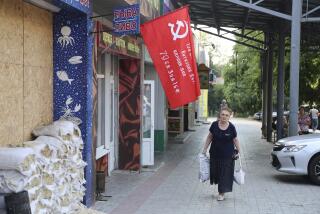Ukraine Opposition Challenges Kravchuk : Politics: The call for a referendum on dissolving the legislature puts president on the defensive.
- Share via
KIEV, Ukraine — A coalition of Ukrainian nationalist and pro-democracy forces emerged here Tuesday to challenge President Leonid Kravchuk’s government, ending his six-month political honeymoon with the country’s opposition groups.
Meeting after a boisterous rally of more than 3,000 miners, teachers and physicians in front of the Ukrainian Parliament, opposition leaders agreed on a petition drive for a referendum on dissolving the legislature, elected in 1990 in the waning years of Soviet rule.
This effectively continues the campaign, which peaked late last year in the overwhelming vote for independence, to establish a new political and constitutional order in Ukraine. However, it puts Kravchuk, a Communist leader-turned-nationalist, on the defensive.
“The Supreme Rada (Parliament) has proved its inability to govern,” Vyacheslav Chornovil, a co-chairman of the nationalist movement Rukh, said after opposition leaders agreed on a plan to challenge the Kravchuk government. They seek the replacement of the current Cabinet and a stronger start on economic reforms.
“Considering when it was formed (in March, 1990, elections), it obviously does not reflect the current configuration of political forces,” Chornovil continued, noting the deep divisions among former Communists, local officials and nationalists of every stripe.
The round-table discussion after the protest included all major political parties and movements. Most have been as critical of each other as they have been of Kravchuk.
Criticism of Kravchuk has been muted until now. Opposition politicians felt a loyalty to him as Ukraine’s new president--and were divided among themselves on alternative policies. Kravchuk, further, succeeded in bringing many of his critics into the government.
“As long as Kravchuk was involved in building the new nation state, it was more or less taboo to criticize him,” Daniil Yanevsky, a Kiev political scientist, said. “All the opposition has been muffled, in fact, through various handouts--ambassadorial appointments, positions as government advisers.”
Ivan Zayzets, a radical nationalist in the Parliament, said Kravchuk is no longer untouchable.
“There was a period when our goals coincided, but it was, after all, the Communists who put him on his throne,” Zayzets said.
Yanevsky attributed the criticism of Kravchuk and the push for greater reforms to rising prices and other economic problems.
“When a liter of milk costs 11 rubles (more than an hour’s pay), and prices continue to go up, people simply cannot afford to live,” Yanevsky said.
The coupons that the Kravchuk government so proudly issued earlier this year to replace the Russian ruble as a local currency at a rate of 1 coupon for 10 rubles are now worth only 70 kopeks despite the ruble’s devaluation in Moscow.
The West has been hesitant to provide the multibillion-dollar aid that Ukraine expected, largely because of the slow pace and limited scope of economic reforms.
And relations with Russia, far more important than those with the United States, Canada or France, where Kravchuk has traveled extensively, remain at what many Ukrainians regard as a dangerous low. Kravchuk is now scheduled to meet Russian President Boris N. Yeltsin next week.
What may have galvanized the nationalists and liberal democrats into forming their loose coalition, even more than the demonstration Tuesday, was the weekend congress of the Ukrainian Socialist Party, which opinion polls show rapidly winning support although it is the successor to the Communist Party here.
Special correspondent Shprintsen reported from Kiev and Times staff writer Parks from Moscow.
More to Read
Sign up for Essential California
The most important California stories and recommendations in your inbox every morning.
You may occasionally receive promotional content from the Los Angeles Times.









